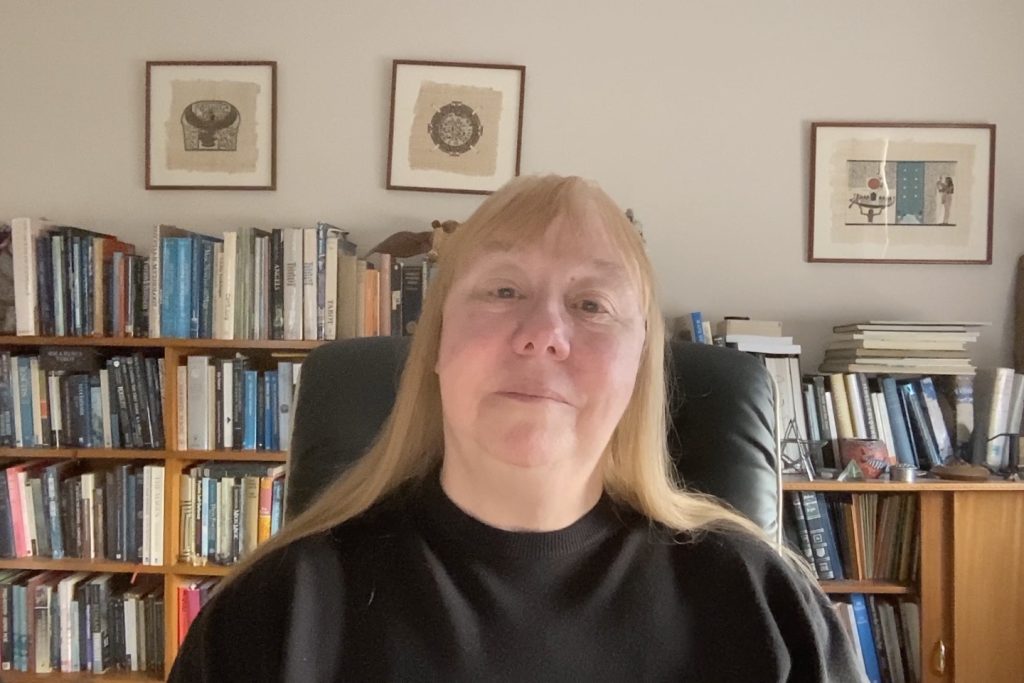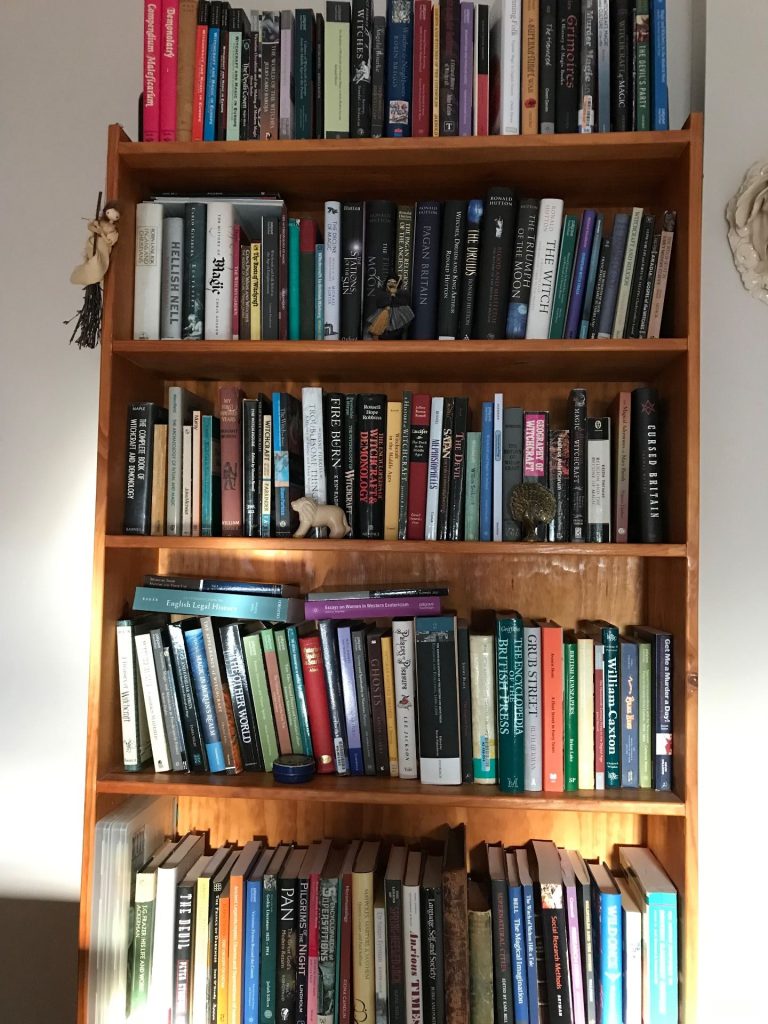In the latest in our #PhDone series, we caught up with Dr. Julia Phillips.
Julia took early retirement in 2017 after 25 years as a CEO in the not-for-profit sector in England and Australia. She also worked in travel and tourism, as a lecturer at Warwickshire College, distribution management, financial management, and programmer/systems analyst. In her words: ‘It’s a varied background!’
Hi Julia! First of all, congratulations on your successful viva! Can you tell us a bit about what your doctoral research was about?
My research examined the way that witchcraft was portrayed in the press in Victorian Britain. Although newspapers were my primary source, the main purpose was to investigate the place of witches in Victorian culture as revealed by newspaper reports, rather than the place of witchcraft within nineteenth century journalism. The study looked specifically at what Victorian newspapers considered to be witchcraft, rather than what contemporary alleged practitioners considered to be witchcraft, or what academics today might consider to be witchcraft.
I conducted my research using the British Newspaper Archive, which when I began my PhD had around 40 million scanned pages and at the time of writing this blog has 63.5 million scanned pages.
I was very fortunate in my choice of research method because I began in September 2019 and the pandemic hit in March 2020. Libraries and archives had to close, but my source material was online and so I spent most of the pandemic period working in my study at home.
How did you become interested in witchcraft and the press?
It goes back a long way!
I have never decided what I think ghosts might be, but I grew up in a house that had all the classic signs of being haunted, so I was always interested in the supernatural. I also had a very memorable experience as a young child while staying in a very remote, rural part of Ireland. A local farmer spun an amazing tale one night about the king and queen of the fairies, which made a real impact on me.
My interest in historical witchcraft began in the 1970s and was inspired by lectures at the Society of Psychical Research in London. I immediately began buying and reading books about witchcraft (which actually came in very handy when I needed to do my literature review) and I maintained a strong interest in the subject over the years. In the 1980s I went along to ‘Witchcraft, Folklore and Mythology’ classes at a South London College each week, run by a sociologist called Ken Rees, and then in the early 1990s I attended an adult education course on ‘Witchcraft and Literary History’ at Sydney University.
In preparation for a talk I had been invited to give about ‘Witches and Cunning Folk’ in 2013 I decided to run a quick search on the British Newspaper Archive digital database using ‘witch,’ ‘witchcraft,’ and ‘cunning’ as my search terms. This was relatively early days in the use of digital archives but even then, a significant number of pages had been scanned.
The result surprised me as it showed an enormous peak in the number of references to the words ‘witch’ and ‘witchcraft’ during the years 1850-1899, which at first glance appeared to contradict the conventional view that belief in witchcraft declined during the nineteenth century. Further investigation during my PhD research revealed several reasons for the peak, but its apparent incongruity grabbed my attention at the time and directly led to me submitting a proposal to the University of Bristol in 2019 so that I could investigate the reasons for such an apparent oddity.
What did you enjoy most about your project?
What I enjoyed most was the discipline of conducting ‘serious’ research into a subject that has fascinated me for years and having two great supervisors (Ronald Hutton and Will Pooley) who guided and supported me. My Masters degree (Deakin University, Melbourne) was in Business and Law to support my professional career, so having the freedom to choose to study a subject that I had been passionately interested in for more than 40 years was very appealing.
What surprised me most was discovering the variety of ‘witchcraft’ related reports. At the start of the project, I assumed they would mostly be reports of crimes attributed to or associated with witchcraft, but I soon discovered there was a wide range of newspaper references found in the Arts, community events, and the supernatural.
Any top tips for lunch spots near your archives / libraries / museum collections / the Bristol University campus?
Owing to the pandemic I rarely left the study in my home (I live in the Cotswolds), so my lunch spot was mostly own dining room!
Let’s talk about the viva itself. What would you advise someone who is preparing for their own viva?
Approach it with the conviction that the examiners want you to pass with flying colours and they are not going to trip you up with trick questions. I read my dissertation aloud several times in the approach to my viva, which can flag up awkward phraseology as well as imprinting the key concepts more firmly in your mind.
I also submitted papers to a number of conferences on different aspects of my research, which was a great way to focus my ideas and get feedback from colleagues. My research covered a wide range of subjects, so being able to present to conferences about (e.g.) the media or nineteenth century politics gave me an opportunity to be tested beyond the specifics of witchcraft and gave me confidence when discussing my research with others.
What’s next for you? Where can we find your research and/or writing now?
I am currently researching the emergence and evolution of modern pagan witchcraft in the twentieth century. This includes an examination of the impact of Margaret Murray on contemporary witch beliefs, and what influence anthropology and folklore had on the growth of witchcraft in the twentieth and twenty-first centuries. My initial findings were presented as part of the series of lectures for the ‘Last Tuesday Society’ under the title ‘The Untold Chapter of British Traditional Wicca’ and I’m currently writing an academic paper on the topic.
On 10 February 2023 I am giving a paper about Sir James Frazer and The Golden Bough: ‘Shaking the Tree, Breaking the Bough: Frazer’s Golden Bough at 100.’ The conference is hosted by Drs. Caroline Tully and Stephanie L. Budin under the auspices of the University of Melbourne – for program details and the link, you can email Goldenboughconference@gmail.com
I’ve recently published chapters and articles on Madeline Montalban (in Essays on Women in Western Esotericism, edited by Amy Hale, Palgrave Macmillan, Cham, 2021) and the Museum of Witchcraft and Magic in Boscastle (in Magic, Ritual and Witchcraft). I’ve got another piece in the works on witch bottles, co-authored with Ceri Houlbrook.


